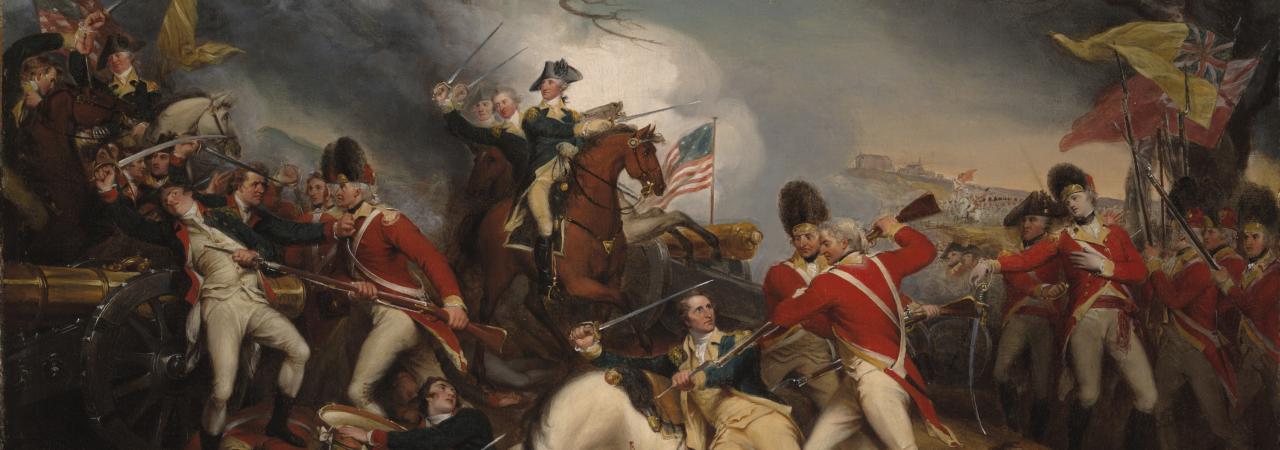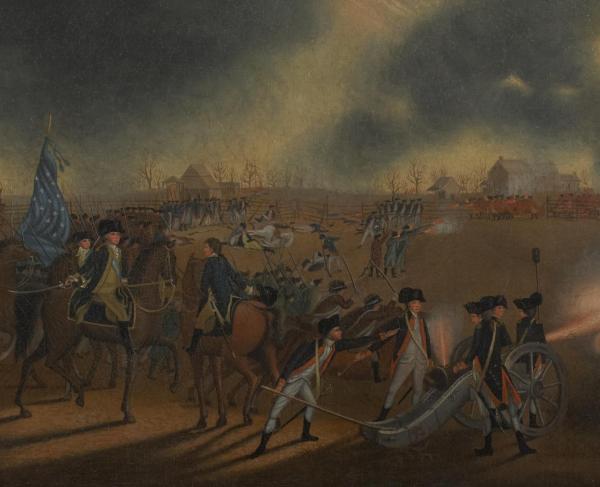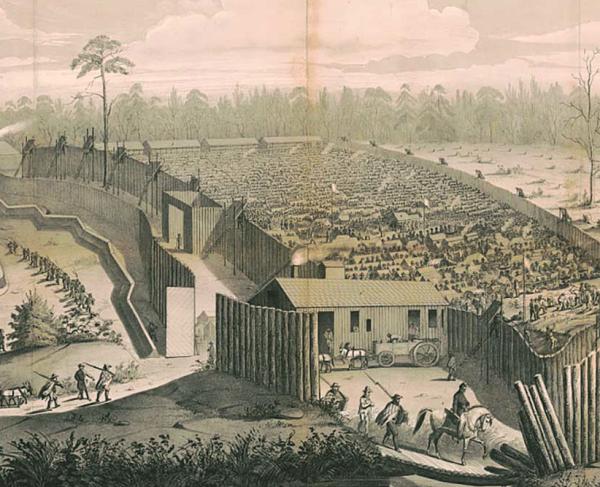The Tale of Two Mercers

In his famed “Battle of Princeton” painting, 18th-century artist John Trumbull celebrates George Washington’s heroic arrival on the battlefield (on a brown horse, with Dr. Benjamin Rush) and depicts British grenadiers bayoneting Washington’s friend, Gen. Hugh Mercer. Mercer died 9 days later in the battlefield’s Thomas Clarke House, despite Dr. Rush’s care.
Interwoven into America’s beginnings, the Mercer family has been witness to glorious triumphs and treacherous defeats. Our tale of two Mercers lends itself to two specific fellows. On one hand, there is the gallant Hugh Mercer of the American Revolution. On the other hand, is his like-named grandson, Hugh Weedon Mercer, of the American Civil War. Facing the hardships of war, each Hugh had his own unique story.

Hugh Mercer of the American Revolution was not native to the land he fought for. Born in Pitsligo, Scotland in 1726, he was the son of a minister but entered into the field of medicine. Trained at a young age, Mercer attended the University of Aberdeen’s Marischal College from 1740 to 1744 to study the medical arts. By 1746 he served as surgeon’s mate at the Battle of Culloden, tending to the injured on the Scottish fields. He went against the British and fought on the side of Edward Stuart’s Jacobite forces. Consequently, becoming a fugitive after British victory, the young Scotsman made the long journey to America in the fall of 1746. It wasn’t long after he settled in the colony of Pennsylvania that tensions mounted and resulted in the French and Indian War. In 1756 Mercer was made a captain in Pennsylvania’s provincial armed forces, and quickly rose to the rank of lieutenant colonel by 1758, and colonel soon after. Such service led Mercer to meet the future first president of the United States, George Washington, who was then serving as a colonel in the Virginia Militia. After mustering out of service in 1761, Mercer packed up his Pennsylvania residence and resettled in Fredericksburg, Virginia. There, he started a family of his own with Ms. Isabella Gordon, opened a physician’s apothecary and practice, and tended to George Washington’s family among other Virginians.
Mercer ran in the same social circles as George Washington and other prominent patriots, finding himself in a position against the oppressive British once again. While Mercer had previously opposed the British in the Battle of Culloden and fought for the British during the French and Indian War, he decided to take up arms against the British when the Revolution came to fruition. The then 49-year-old Mercer was elected as a colonel in Virginia’s militia.
While Mercer started the war as a man of the militia, he quickly transitioned to an officer in the Continental Army with his Virginia troops integrated into the main army. General Mercer commanded a brigade at the Battle of Trenton. In the coming days, Mercer returned to lead his brigade at the Second Battle of Trenton. In a narrow escape from the British forces under Charles Lord Cornwallis, the Continentals made their way north to Princeton.
In the northward mission, Hugh Mercer’s forces were detailed to destroy the Post Road Bridge at Princeton. Mercer’s brigade of approximately 300 men were advancing towards the bridge when scouts spotted British troops strategically placing themselves to split the two American columns. Mercer reacted by guiding his troops into line formation and marching them towards an orchard, where the British had placed artillery to attack the opposite column of Patriots. He ordered his men to fire. A brief, but fierce firefight broke out. The British charged Mercer’s men Mercer attempted to rally his men back into formation. However, his horse was injured and Mercer was dismounted. Ultimately surrounded, Mercer was clubbed and bayoneted repeatedly. While Mercer fell, General Washington swept in with reinforcements to outnumber and defeat the British at Princeton. Despite his death, the legacy of Hugh Mercer’s heroic actions has lived on. The hit Broadway musical Hamilton even makes mention of him as the cast sings, “Did'ya hear the news about good old General Mercer?”
31 years after the tragic death of Brigadier General Hugh Mercer, his grandson Hugh Weedon Mercer was born in Fredericksburg, Virginia. Following in his family’s footsteps, Hugh Weedon Mercer pursued a military career and attended the United States Military Academy at West Point. While he was threatened expulsion for his participation in the infamous Eggnog Riot of 1826, he did indeed graduate thanks to a pardon from President John Quincy Adams – he was even third in his class! Upon graduation from West Point, Mercer was stationed in Savannah, Georgia. The town became his longtime home as he married Ms. Mary Stites Anderson of a local Savannah family. After resigning from his military commission in 1835, Mercer began work as cashier of the Planter’s Bank in 1841 and held this post until the beginning of the Civil War.
At the outbreak of the Civil War, at age 53, Hugh Weedon Mercer took up arms for the Confederacy. His choice to fight on the behalf of the Southern cause reflected his concerns. With his work invested in the South’s financial well-being, his livelihood was dependent on the fate of the South. While his grandfather had fought for the unification of the new nation, Hugh Weedon Mercer took the side of its destruction.
In 1861, Mercer began his service as a colonel of the First Georgia Infantry. Like his grandfather, he quickly rose through the ranks and became brigadier general on October 29th, 1861. Commanding a brigade of three Georgia regiments, he and his men fought at Savannah and went on to participate in the Atlanta campaign of 1864. He saw action at Dalton, Marietta, Atlanta, and Kennesaw Mountain, the latter being land that the American Battlefield Trust has helped to save!
While his grandfather faced an unfortunate fate in the Revolutionary War, General Hugh Weedon Mercer was more fortunate in his Civil War service. Mercer did not fall to that of a club or bayonet but illness did force to him to retire from service and return to his work at the Planter’s Bank. With the bank dissolving in March of 1869, Mercer made the move to Baltimore, Maryland where he began work as a commission merchant. All the while, his health continued to worsen and he sought out treatment in Germany. Spending the last 5 years of life there, Hugh Weedon Mercer passed in Baden-Baden, Germany on June 9th, 1877.
A family name carries many stories – from Pitsligo, Scotland to America’s battlefields to the town of Baden-Baden, Germany! Both of our Hugh Mercers lived adventurous and challenging lives, especially with the paths they traversed as soldiers. From grandfather to grandson, you witness the evolution of a young country and the trying decisions that impacted America’s families.
Related Battles
75
270
3,000
1,000


